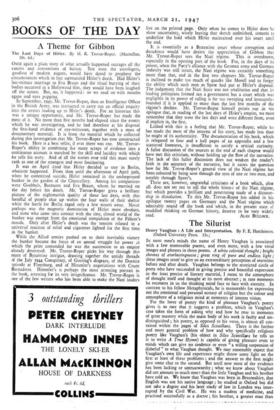BOOKS OF THE DAY
A Theme for Gibbon
ONCE again a plain story of what actually happened outrages all the canons and conventions of fiction. Not even the astrologers, gaudiest of modern augurs, would have dared to prophesy the circumstances which in fact surrounded Hitler's death. Had Hitler's last-minute marriage to Eva Braun and the ritual burying of their bodies occurred in a Hollywood film, they would have been laughed off the screen. But, no, it happened: so we read on with mouths agape and eyes popping.
In September, 1945, Mr. Trevor-Roper, then an Intelligence Officer in the British Army, was instructed to carry out an official enquiry into the events leading up to Hitler's dearth. For an historian this was a unique opportunity, and Mr. Trevor-Roper has made the most of it. No more than five months had elapsed since the events which he was investigating, and he had therefore at his disposal the first-hand evidence of eye-witnesses, together with a mass of documentary material. It is from the material which he collected during this investigation that Mr. Trevor-Roper has now constructed his book. Here is a best seller, if ever there was one. Mr. Trevor- Roper's ability in combining the many scraps of evidence into a continuous account is matched by the skill and lucidity with which he tells his story. And of all the stories ever told this must surely rank as one of the strangest and most fascinating.
It was on April 22nd that Hitler decided to stay in Berlin, whatever happened. From then until the afternoon of April 3oth, when he committed suicide, Hitler remained in the underground bunker in the garden of the Chancellery. Among his companions were Goebbels, Bormann and Eva Braun, whom he married on the day before his death. Mr. Trevor-Roper gives a brilliant picture of the nightmarish quality of these last days, with this handful of people shut up within the four walls of their shelter while the battle for Berlin raged only a few streets away. Never perhaps was the magnetic domination of Hitler more absolute, and none who came into contact with the tiny, closed world of the bunker was exempt from the emotional compulsion of the Fiihrer's moods. Only after Hitler's death was the tension relaxed in a universal reaction of relief and cigarettes lighted for the first time in the bunker.
While the Allied armies pushed on to their inevitable victory the bunker became the focus of an unreal struggle for power ..rt which the prize contended for was the succession to an empire already destroyed. Mr. Trevor-Roper picks his way through this maze of Byzantine intrigue, drawing together the untidy threads of the July 1944 Conspiracy, of Goering's disgrace, of the Doenitz episode at Flensburg, and of Himmler's negotiations with Count Bernadotte. Himmler's is perhaps the most arresting portrait in the book, arresting for its very insignificance. Mr. Trevor-Roper is one of the few writers who has been able to make the Nazi leaders live on the printed page. Only When he comes to Hider does he show uncertainty, wisely leaving that sketch unfinished, content to underline the hold which Hitler maintained over his court until the end.
It is essentially as a Byzantine court whose corruption and decadence would have drawn the appreciation of Gibbon that Mr. Trevor-Roper sees the Nazi regime. This is overdrawn, especially in the opening part of the book. For, in the days of its power, when the Patty's alliance with the German army and German industry was still intact, the Nazi regime was certainly something more than that, and in the first two chapters Mr. Trevor-Roper is inclined to make too much of quacks like Morell and to forget the ability which such men as Speer had put at Hitler's disposal. The judgement that the Nazi State was not totalitarian and that its leading politicians formed not a government but a court which was negligible in its power of ruling is far too sweeping and insecurely- founded if it is applied to more than the last few months of the regime's decline. Mr. Trevor-Roper himself points out in his epilogue that, in reading of the last days of Hitler's empire, we must remember that they were the last days and were different from, even if implicit in, the first.
Linked with this is a feeling that Mr. Trevor-Roper, while he has made the most of the interest of his story, has made less than he might of its authenticity. The documentation of his book, which is relegated to four and a half pages of an appendix and a few scattered footnotes, is insufficient to satisfy a critical curiosity.
A fuller discussion of the sources at the end of each chapter would have met this criticism, without holding up the flow of the narrative. The lack of this fuller discussion does not weaken the reader's faith in the accuracy of the narrative, but it raises the question how far Mr. Trevor-Roper's general view of the Nazi regime has been coloured by being seen through the eyes of one or two men, and notably through Speer's.
These are, however, ungrateful criticisms of a book which, after all, does not set out to tell the whole history of the Nazi regime, but which provides a brilliant and penetrating study of a dictator- ship in dissolution. To this Mr. Trevor-Roper has added in his epilogue twenty pages on Germany and the Nazi regime which admirably round off the book and which, in the present state of muddled thinking on German history, deserve to be very widely


































 Previous page
Previous page